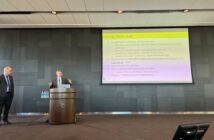
Karen Salvemini sits in her new office on Tuesday, Feb 3, 2015. Salvemini has been appointed to Equal Opportunity Compliance Coordinator, a new position at Lehigh. (Raven Atkins/B&W photo)
In response to Lehigh University’s Office of Civil Rights voluntary resolution agreement, Lehigh’s Office of the General Council has hired Karen Salvemini, Esq., as the Equal Opportunity Compliance Coordinator.
In an email sent to the Lehigh community Jan. 26 by Interim President Kevin Clayton and Provost Patrick Farrell, Salvemini’s position is described as being “responsible for coordinating the university’s efforts and initiatives to ensure compliance with all equal opportunity laws, as well as engaging the campus community in educational initiatives and implementation of best practices in the reporting and response to incidents of discrimination and harassment.”
The creation of this position was not required by the OCR resolution but will “be an important element of our compliance and campus climate initiatives,” according to the email. Salvemini will be the university’s primary point of contact for all equal opportunity compliance issues, including bias response incidents.
After holding the position for only a little more than a week, Salvemini has begun to see how things are handled at Lehigh.
“We have general ideas of what the position is going to be and different focuses, but it’s really going to be a matter of seeing where the need is and adapting the role to meet those needs,” she said.
A lot of Salvemini’s current work is focused on working through the OCR resolution. She is helping to make sure Lehigh is meeting both the deadlines and criteria outlined in the agreement.
“I’ve been working with a lot of those issues and making sure we’re addressing all of them and meeting the timeframes that we’re required to meet,” she said.
The Office of the General Counsel handles all university legal matters, while Salvemini will be focusing specifically on equal opportunity compliance and affirmative action policies. Equal opportunity compliance involves addressing employment, discrimination and harassment laws such as Title XI, Title XII and Title IX. Salvemini will also be working on getting affirmative action policies in place and making sure they are implemented properly.
“(The Office of the General Counsel) as a whole handles all legal matters and then my role is more to deal with the compliance issues and affirmative action,” she said.
While she is currently her own separate entity, Salvemini will be collaborating with the five other members of the Office of the General Counsel as well as other offices on campus.
One of these colleagues is Frank Roth, Esq., General Counsel in the Office of the General Counsel.
“Compliance is one part of our practice and this area of equal opportunity is really important,” he said. Especially when the Office of General Counsel is focusing on other issues such as reviewing university contracts, defending litigation, advising the board of trustees and dealing with governance issues, Roth said it is essential to have someone to focus on compliance.
Compliance professionals are a growing trend in higher education law, according to Roth. Some universities choose to have professionals that span all of the compliance obligations of the university, but Lehigh has tailored Salvemini’s position to equal opportunity.
“We decided to focus on the equal opportunity compliance requirements. It really is a growing trend because there are so many compliance obligations, because we receive federal funds and it’s part of the way the federal government and the state government regulate higher education,” Roth said.
Salvemini agreed that she has seen a growth in compliance positions at colleges and universities. Schools are beginning to appoint a professional to coordinate these efforts instead of having it divided throughout the institution.
“In the area of colleges and universities, Title IX especially is a significant area. It’s becoming more and more of a prevalent issue,” Salvemini said.
Another part of her job will be involving investigations including those related to the workplace and students.
“A lot of that stuff is going to run through this office and depending on who’s involved – faculty, staff, or student – getting different departments on campus involved as well,” Salvemini said. This work is also going to include revising policies on campus for processes of dealing with complaints.
“We’re making sure that when we’re actually putting them into place, they work,” Salvemini said.
Farrell said the level of efforts needed in the areas of compliance at Lehigh has grown significantly over time.
“The responsibilities have been a little distributed, so no single individual has been responsible for all of these pieces,” he said. “While not totally problematic, it does get challenging as the expectations of the federal government continually increases.”
Lehigh used positions at other universities to create and shape the Equal Opportunity Compliance Coordinator position and then held a national search.
“We compared and benchmarked against other colleges and universities that have similar positions,” Roth said. They were looking for someone with experience in equal opportunity litigation and preferably a law degree. According to Roth, the interview process was key for getting a candidate’s sense of commitment to the area and if the candidate had the interpersonal skills it takes to receive complaints and investigate.
Roth also noted that Salvemini’s job will have an education component as well.
“(She) is going to be coordinating all of the university’s educational efforts, and there’s a lot of people involved in that,” Roth said.
Her coordinator position will include helping involve groups on campus and get the word out about educational programs. These programs will consist of both online and in-person programs. Lehigh is required to promote an online training tool which is now available to all students, faculty and staff. It will help educate members of the campus community about all forms of harassment. It is expected that all faculty, staff and students will complete the online training by March 1. Roth said that it is important to be aware of these issues both on campus and in the work world for the future.
Since the university is so large and decentralized, the coordinator position is needed to make sure everything is happening throughout the institution, Roth said.
He said that many things in the OCR agreement were going to be done already simply due to their importance to colleges and universities.
The other areas that the OCR email update addressed were education and training on racial harassment, revision of the university’s harassment policy, a series of student-focused remedies to prevent and eliminate racial harassment and the creation of a campus climate survey. Efforts that will now involve Salvemini’s position.
“One of the challenges of having these duties distributed amongst many people is sometimes the training of the campus as a whole gets lost,” Farrell said, citing the example of Title IX and harassment training. While the two areas differ, they share similar ideas and could possibly see collaboration to work more effectively. Previously these were coordinated by different people, now under Salvemini, collaborations like this will be more common.
“There’s real advantage in having somebody whose responsibility is not just managing the compliance part, but also looking at the various interconnections across the different kinds of requirements and saying where are there opportunities for combined training,” Farrell said.
All of these responsibilities are now concentrated in Salvemini’s position. It will be easier and more clear for the university to have a single point of contact for the issues that were previously divided amongst departments, said Farrell.
He is also looking for Salvemini’s position to help the campus become more proactive regarding issues of equal opportunity.
“This position will help us think about the way in which we can engage more people around these topics across the campus in a proactive way,” Farrell said. If the campus is thinking about these issues from the beginning, issues of compliance won’t be necessary.
While Salvemini isn’t the only person involved in these efforts, her background and experience in OCR, compliance and federal government will be an asset to Lehigh.
“I expect her to be part of a core group of folks for whom (campus climate is) a big part of what they think about every day,” Farrell said.
A magna cum laude graduate of Widener University School of Law and DeSales University, Salvemini is a former associate of the Rhoads & Sinon law firm in Harrisburg, where she gained significant experience in civil litigation and equal opportunity compliance.
“This job kind of combines both of those interests and the things that I really enjoyed about my past job. So that’s what I’m really looking forward to about this position, is being able to combine both of those and work for a college and promoting the college and doing what I can to make it better,” she said.





Comment policy
Comments posted to The Brown and White website are reviewed by a moderator before being approved. Incendiary speech or harassing language, including comments targeted at individuals, may be deemed unacceptable and not published. Spam and other soliciting will also be declined.
The Brown and White also reserves the right to not publish entirely anonymous comments.